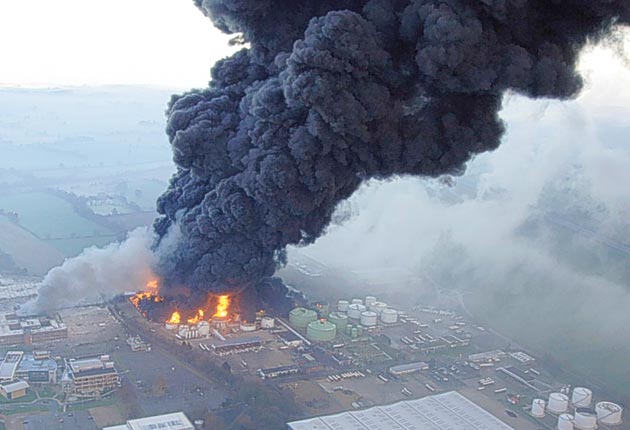£10m: the fines handed out to firms behind £1bn Buncefield explosion

Your support helps us to tell the story
From reproductive rights to climate change to Big Tech, The Independent is on the ground when the story is developing. Whether it's investigating the financials of Elon Musk's pro-Trump PAC or producing our latest documentary, 'The A Word', which shines a light on the American women fighting for reproductive rights, we know how important it is to parse out the facts from the messaging.
At such a critical moment in US history, we need reporters on the ground. Your donation allows us to keep sending journalists to speak to both sides of the story.
The Independent is trusted by Americans across the entire political spectrum. And unlike many other quality news outlets, we choose not to lock Americans out of our reporting and analysis with paywalls. We believe quality journalism should be available to everyone, paid for by those who can afford it.
Your support makes all the difference.Environmental campaigners and politicians last night condemned the "leniency" of multimillion-pound fines imposed on the companies responsible for the Buncefield oil depot explosion.
Five companies were ordered to pay almost £10m in combined fines and costs following the blast – the largest in peacetime Europe. But they were a fraction of the £1bn worth of damage caused to the Hertfordshire town by the fire which took place four-and-a-half years ago.
The local Tory MP, Mike Penning, now a junior transport minister, said he is writing to the Attorney General to see if he can get the Government to appeal against the fines, handed down at St Albans Crown Court, which he described as "worse than peanuts".
"This is a massive, massive insult," he said. "I just don't understand how companies that do damage costing more than £1bn can end up being told to hand over their loose change. It's just unbelievable – totally unbelievable.
"The Attorney General has the powers to call the papers in and appeal against an unduly lenient sentence in a criminal case. I'm not a lawyer, and I don't know if the Government has those powers in a corporate case – but somebody has to do something, so I'm writing to the AG asking him to step in.
"They can't treat my community like this. In the boardrooms, they have to be not just aware but involved in the safety of places like this depot. This sort of fine is not going to worry them in the slightest."
Des Collins, the Hemel Hempstead-based solicitor who represents 275 victims of the disaster, described the fines as "hardly even a slap on the wrists".
He added: "The sentences in this case do not even begin to punish the companies, given the extent of some of their profits. Total's fine, plus court costs, is around 0.003 per cent of its profits in the first three months of this year. This is hardly an incentive to encourage those in management to do everything they can to ensure it doesn't happen again. This is a drop in the ocean to French oil giant Total."
Five companies were fined £5.35m altogether and ordered to pay costs of £4.08m. Total Oil has been told to pay a £3.6m fine, plus £2.4m costs, which is the biggest in British legal history, but does not look so large when set against the company's reported profits for the first quarter of 2010 of £2,180m.
Hertfordshire Oil Storage, a company jointly owned by Total and Chevron which ran the Buncefield depot, was fined £1.45m plus £1m costs. The British Pipeline Agency, jointly owned by BP and Shell, was fined £300,000 plus £480,000 costs. Two other firms, Motherwell Control Systems 2003 Ltd and TAV Engineering were fined £1,000 and each ordered to pay £500 in costs.
The December 2005 fire destroyed the depot after faulty equipment had allowed 250,000 litres of fuel to spill, creating a vapour cloud which exploded and set the depot alight. The explosion was heard 125 miles away.
Though no one was killed, 43 people were injured, dozens of families were rendered homeless in the run up to Christmas, and more than 1,000 jobs were lost locally when business relocated. Sentencing the firms at St Albans Crown Court, the judge, Sir David Calvert-Smith said: "Had the explosion happened during a working day, the loss of life may have been measured in tens or even hundreds."
He added that the catastrophe had not come about through cost cutting. "This case has more to do with slackness, inefficiency and a more-or-less complacent approach to matters of safety," he said.
Despite protests about the fine, the agencies involved in prosecuting Total and the other companies expressed satisfaction yesterday that they had won their case. Howard Davidson, Thames director at the Environment Agency, said: "As a result of a successful prosecution, five companies have been held to account for their failures."
Neal Stone, of the British Safety Council, said that the fines "reflect the gravity of the offence." But he added: "The consequences of the Buncefield explosion could have been catastrophic. The fact that there were no deaths or major injuries was fortuitous."
Join our commenting forum
Join thought-provoking conversations, follow other Independent readers and see their replies
Comments